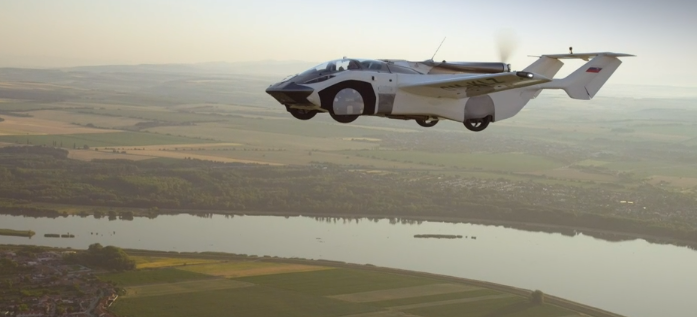European Flying Car Technology Acquired by Chinese Firm
- tech360.tv

- Mar 28, 2024
- 2 min read
Chinese firm acquires European flying car technology. AirCar, powered by a BMW engine, successfully test-flown in Europe. Hebei Jianxin Flying Car Technology Company secures exclusive rights in China.
In a groundbreaking deal, a Chinese company has acquired the technology behind a flying car that was originally developed and successfully test-flown in Europe. The AirCar, powered by a BMW engine and normal fuel, completed a 35-minute flight between two Slovakian airports in 2021, utilising runways for take-off and landing. Impressively, it only took a little over two minutes for the vehicle to transform from a car into an aircraft.
The Hebei Jianxin Flying Car Technology Company, based in Cangzhou, has secured exclusive rights to manufacture and utilise AirCar aircraft within a specific undisclosed area in China. The company has even constructed its own airport and flight school following a previous acquisition from a Slovak aircraft manufacturer. Anton Zajac, co-founder of KleinVision, the company behind AirCar, confirmed the sale and highlighted the Chinese firm's commitment to advancing flying transport solutions.
China, known for its leadership in the electric vehicle revolution, is now actively exploring flying transport options. Just last month, Autoflight conducted a successful test flight of a passenger-carrying drone between Shenzhen and Zhuhai, completing a journey that typically takes three hours by car in just 20 minutes. Additionally, eHang, a Chinese firm, was awarded a safety certificate for its electric flying taxi, with the UK government predicting that flying taxis could become a regular sight in the skies by 2028.
Unlike drone-like passenger aircraft, the AirCar does not take off and land vertically but requires a traditional runway. While the exact financial details of the technology sale remain undisclosed, AirCar received a certificate of airworthiness from the Slovak Transport Authority in 2022 and gained attention after being featured in a video by popular YouTuber Mr Beast earlier this year.
However, there are still significant challenges to overcome in terms of infrastructure, regulation, and public acceptance of this new form of transport. Aviation consultant Steve Wright noted that the introduction of personal flying transport is a transformative development but also emphasised the need for careful consideration of the associated questions and concerns.
The global community is grappling with the task of regulating this emerging sector, with many scrambling to address the unique challenges it presents. Wright highlighted that the West's tendency to fit new technologies into existing frameworks can slow down progress, while China may view this as an opportunity to take the lead.
This acquisition of the Slovakian AirCar technology raises questions about China's potential to revolutionise the flying car industry. While prototypes like the AirCar are exciting and fun, the reality of everyday use may involve mundane aspects such as queues and baggage checks. Nonetheless, the acquisition marks a significant step forward in the development of flying transport and showcases China's determination to be at the forefront of this innovative field.
Chinese firm acquires European flying car technology
AirCar, powered by a BMW engine, successfully test-flown in Europe
Hebei Jianxin Flying Car Technology Company secures exclusive rights in China
Source: BBC



